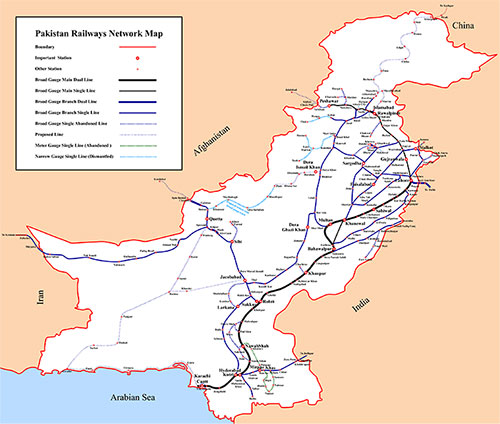China, Pakistan Agree US$10 billion Main Line 1 Railway Link
Will ultimately connect Kabul to Karachi and give Afghanistan Indian Ocean access
President Xi Jinping has said China will continue to support Pakistan to help it stabilise its economy, as he hosted Pakistan’s new Prime Minister Shehbaz Sharif for discussions.
The leaders met at Beijing’s Great Hall of the People on Wednesday, (November 2) the last day of Sharif’s two-day visit to China, and his first since taking office in April. China has to date invested over US$60 billion into the China-Pakistan Economic Corridor (CPEC), which is designed to raise Pakistan’s capabilities as a self-sufficient, industrialised nation. That has been further enhanced with Xi agreeing to spend a further US$10 billion on the Pakistan ‘Main-Line 1’ railway project, which is intended to provide high speed rail between Pakistan’s southern Indian Ocean port of Karachi to Peshawar, an industrial city close to the Pakistan border with Afghanistan. That can be expected to eventually be part of an extended CPEC reach into Jalabad and Afghanistan itself and would ultimately provide rail links from the Afghanistan capital Kabul to the Indian Ocean, greatly enhancing its ability to engage in global trade.

China has already indicated it is ready to invest in Afghanistan by funding additional railways extending from Uzbekistan to Kabul and from Iran to Herat. Beijing sees increasing Afghanistan’s trade potential as a key element of the countries development and as a means to secure peace.
Much of China’s involvement in Pakistan has been to develop energy resources, as well as infrastructure, much of which dates back to colonial times and is well past its operational lifetime. Pakistan, which borders China at a demilitarised zone at Taxkorgan, south of Kashgar in China’s Xinjiang Province, is a key potential overland route for energy supplies from the Middle East in the event of a future Ocean conflict cutting off maritime route supplies. In this context it should be noted that China considers Pakistan as key to its own national security as well as being an investment play.
There have also been plans in place for years to link Pakistan’s national rail network from its current terminus at Gilgit, north of the Pakistan’s capital Islamabad, to Kashgar, and China’s national rail network. This, however,, is probably 20 years away. Xi and Sharif did though also agree to step up the development of Pakistan’s Gwadar Port, a key link between Pakistan and Iran’s Chabahar Port, a distance of just 70km. Chabahar itself links to the INSTC. That provides access to the Caspian Sea and onward transit to Europe, Russia, and Central Asia.
There has been criticism of the amount of debt Pakistan owes to China, however this totals about 30% of Pakistan’s total. The Pakistani government has stated that most of the CPEC projects consist of equity finance such as joint ventures instead of debt finance, giving Pakistan alternative means of raising capital for these.
An interesting side development at the Xi-Sharif talks was the signing of an agreement to permit mutual currency settlements between the Bank of China and the State Bank of Pakistan in terms of RMB Yuan clearing in Pakistan, a tool designed to promote the use of the Chinese currency as opposed to the US dollar in settlements. Current Pakistan-China trade is running at about US$27.5 billion, with China taking the lion’s share of this with exports of US$24.24 billion. However, exports on both sides have been growing and are at current record highs. China’s main exports include electrical equipment, machinery, fuel, pharmaceuticals and iron and steel, while Pakistan exports cotton, copper and cereals to China.
Related Reading





